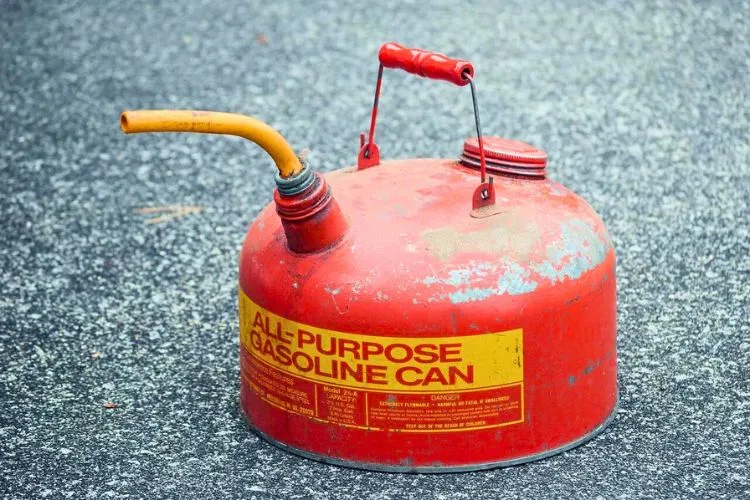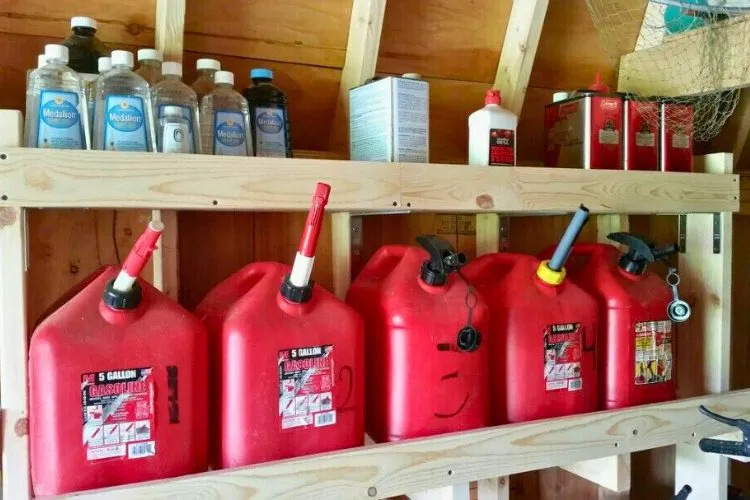In light of rising concerns about emergency preparedness and the efficiency of seasonal equipment, understanding the ins and outs of gasoline storage has never been more pertinent.
So, do you know how long can you store gasoline?
While it might seem straightforward, storing gasoline safely and effectively requires careful consideration to extend its shelf life and ensure safety.
In this guide, we delve into the various factors influencing gasoline longevity, provide best practices for storage, and answer some of the most frequently asked questions on the subject.

How Long Can You Store Gasoline?
Stored gasoline can last 3 to 6 months under optimal storage conditions—cool, dry, and away from direct sunlight—if it’s kept in a properly sealed and labeled container. The shelf life can be extended up to 12 months or slightly more when a fuel stabilizer is added to the gasoline at the time of storage.
It’s important to note that ethanol-blended fuels (such as E10), which are common nowadays, might have a shorter shelf life due to their tendency to absorb moisture, which accelerates degradation.
To ensure the longevity and effectiveness of stored gasoline, it’s recommended to use suitable containers (either high-quality plastic or metal) and consider the addition of fuel stabilizers for extended storage periods. Always monitor stored gasoline for changes in appearance or smell, as these can indicate degradation.
Why Gasoline Storage Duration Varies?
Gasoline, like any other organic compound, is subject to degradation over time. The duration for which it remains usable can be influenced by a variety of factors, including temperature, humidity, and the type of container used for storage. Let’s explore how these elements play a role in the preservation of gasoline.

Temperature fluctuations are a significant factor; extreme temperatures (both hot and cold) can lead to gasoline evaporation and condensation within containers, leading to water contamination. Humidity, too, can introduce moisture into gasoline, especially when stored in non-sealed containers, further degrading its quality.
The choice of container can also greatly affect gasoline’s shelf life. Materials react with gasoline differently; for example, certain plastics can degrade and dissolve in gasoline, contaminating the fuel.
Understanding Gasoline Shelf Life
The shelf life of gasoline is a measure of how long the fuel remains viable and safe for use. Under optimal conditions, gasoline can last from 3 to 6 months when stored in a properly sealed and labeled container.

However, this duration can be significantly extended with the appropriate use of additives and by adhering to best storage practices. For instance, fuel stabilizers can extend gasoline’s shelf life up to a year, and in some cases, even longer.
The variation in shelf life also depends on the type of gasoline. Ethanol-blended fuels (common in the U.S.) tend to absorb moisture and deteriorate faster than pure gasoline. Thus, understanding the type of gasoline you’re storing and the conditions it’s stored under is crucial for predicting its shelf life accurately.
Best Practices for Extending Gasoline Shelf Life
To maximize the shelf life of your stored gasoline, several proven strategies should be employed:
- Choosing the Right Storage Containers: High-quality, durable containers designed specifically for gasoline storage are ideal. Metal containers are often recommended for their durability and resistance to sunlight penetration, although certain types of heavy-duty plastic containers are also suitable. It’s crucial to ensure the container is appropriately rated for fuel storage to prevent contamination.
- The Impact of Storage Conditions: Store gasoline in a cool, dry place away from direct sunlight and extreme temperature changes. This reduces the rate of evaporation and the risk of container damage. Moreover, gasoline should be kept away from electrical equipment and sources of heat to minimize the risk of ignition.
- The Role of Fuel Stabilizers: Adding a fuel stabilizer to gasoline can greatly extend its shelf life by slowing down chemical decomposition. This is particularly useful for gasoline stored for emergency use or for seasonal equipment that isn’t used regularly. Be sure to follow the stabilizer manufacturer’s instructions for the best results.
- Practical Tips for Storage: Always label gasoline containers with the date of storage and the type of gasoline. This helps in tracking how long the gasoline has been stored and in managing rotation. Ensure that containers are tightly sealed to prevent air from entering, which can promote oxidation and evaporation.
Frequently Asked Questions (fAQs)
How long can gasoline be stored in a plastic container?
When using a suitable, high-quality plastic container, gasoline can be stored for up to 3-6 months. Implementing a fuel stabilizer can extend this duration significantly.
Is storing gasoline in a metal container better?
Metal containers offer excellent durability and reduced permeability compared to some plastics, which might make them a preferable option for long-term storage, especially in conditions where physical container damage might be a concern.
Recommended practices for rotating stored gasoline?
To ensure gasoline does not go to waste, employ a first-in, first-out policy. Use the oldest gasoline first, provided it has been stored correctly and is still within its viable shelf life.
Conclusion
The art of storing gasoline safely is nuanced, requiring not just the right materials and conditions but also a vigilant adherence to guidelines that prevent degradation.
By understanding the factors that affect gasoline’s shelf life and following best practices for storage, you can ensure your stored gasoline remains viable for as long as possible, ready for use when you need it most.
Remember, safety is paramount when dealing with flammable substances like gasoline; always prioritize safe handling and storage practices.


